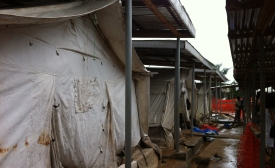international broadcasting
As the new Turkish prime minister, Ahmet Davutoglu is likely to revitalize the role of public diplomacy.

Former VOA Deputy Director on how international broadcasters can stem the tide of Ebola.
What does the Australia Network’s closure and the launch of Sky News’ Australia Channel mean for Australian soft power? Since their inception, Australia’s international media organisations have trodden a fine line between promoting Australia’s interests in the Asia Pacific region and upholding the values of the Fourth Estate which sees critical reporting of government as central to its role.
The Obama administration's new drive to battle the ideology of ISIS using social media is falling short of expectations and its potential because the White House was late to the game, disregarded the work of the previous administration and hasn't properly funded the effort, some experts and government officials say.
Brazilians are starting to pay attention to a different type of football the one played with the hands. American football, once the sport nobody could understand, is quickly gaining space in the land of soccer, attracting a growing number of fans and participants. Brazil already has two well-established semi-professional leagues in place, and television ratings for the NFL are increasing rapidly.
A new study by the U.S. Broadcasting Board of Governors (BBG) and Gallup on women and media in Africa says education and language skills play a big role in influencing which platform women access most frequently. And while daily TV usage for men and women is similar in most places, the same cannot be said for radio, mobile phones and the Internet.
"Lack of knowledge and myths about the disease are killing people as surely as Ebola is," said BBC World Service director Peter Horrocks. Quality information from both within and outside the countries affected about how the risks of Ebola can be safely managed will save lives. "The range of emergency activities on Ebola from the BBC World Service are in the finest traditions of the humanitarian instincts of our broadcasting."
U.S. Under Secretary of State for Public Diplomacy and Public Affairs Richard Stengel says that in the face of strong foreign propaganda machines such as Russia and the Islamic State, the U.S. needs to harden its "soft power" with its own participation in the global conversation.







